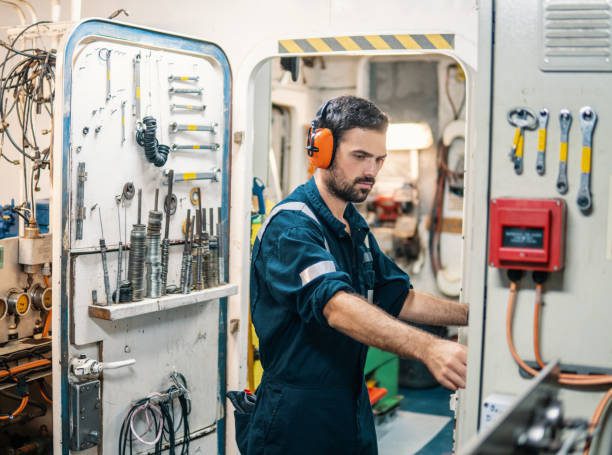
| Boat Mechanic Key Stats | |
|---|---|
| Education | 4+ Years |
| Job Outlook | 1% |
A Boat Mechanic’s job can be compared to that of an Auto Mechanic.
Both provide maintenance and repair work to malfunctioning parts of a transportation vehicle.
An experienced Boat Mechanic knows the inner workings of marine modes of transportation providing services in order for boats to run smoothly and functionally on the sea.
Their work is important in order to prevent unexpected problems that can leave boat owners stranded out at sea.
Boat Mechanics can perform maintenance and repair on several types of vessels.
Some boat Mechanics can work for private firms or for a Military entity, such as the Navy.
Boat Mechanics need to have through knowledge on a boat’s parts and what their functions are in order to provide maintenance and repair.
Someone who wants to become a Boat Mechanic will learn all the necessary skills and engine components by completing a training program or apprenticeship.
Professional Boat Mechanics are adept at working with their hands and use that skill to fix boat engines and provide maintenance.
Another helpful trait to have is proficiency with swimming and having a scuba certification in case a propeller needs repair.
Table of Contents
Education Requirements to Become a Boat Mechanic
In order to become a Boat Mechanic, candidates must receive formal training either by attending a certification program or fulfilling an apprenticeship.
Some programs even offer an Associate’s Degree that requires more schooling and time to complete but that can provide a strong educational background for candidates.
In order to attend an education institution that offers a certificate or Associate’s Degree, people who want to become a Boat Mechanic must have a high school diploma or equivalent.
Most vocational schools or junior colleges offer certification or an Associate’s Degree in boat mechanics.
During a Boat Mechanic certification program, students will learn the basics about boat engines and their components.
Components that students will throughout a program include:
- Boat fuel systems
- Boat electrical systems
- Ignition systems
- Drive systems
- Propellers
Students not only learn the different components that make a boat run, they will learn how to service them and how to troubleshoot any problems an engine may have.
A Boat Mechanic needs to be knowledgeable with the different kinds of engines.
There are two types of engines a Boat Mechanic should be familiar with: inboard engines which are fixed onto a boat and are not normally removed for repairs.
Outboard engines are removable and can get serviced in another location such as a shop.
Some additional differences a boat mechanic should know include the different kinds of fuel the engines use.
Outboard engines and motors run on gasoline while inboard motors are found in cabin cruisers or large fishing boats.
Certification makes a candidate seem more reliable and knowledgeable about boat maintenance.
An organization that grants certification in order to become a Boat Mechanic is the American Boat and Yacht Council (ABYC), a nonprofit organization that sets standards for the industry.
For more information regarding earning certification from the American Boat and Yacht Council go to: ABYC
Boat Mechanic Job Description
Boat Mechanic Specialists are responsible for the preventive maintenance and repair of motorized boats.
An experienced Boat Mechanic is able to troubleshoot and repair inboard or outboard engines using the skills they learned with either on the job experience or by attending a training program.
Job Duties include:
- Perform maintenance or repair work on various types of engines such as gasoline, outboard motors and marine engines
- Performs tests on engines and other equipment to determine whether they need repairs or fine-tuning
- Use a variety of tools in order to repair and provide maintenance work
- Buys necessary supplies and parts and make equipment suggestions
Boat Mechanic Salary and Career Path
The outlook for Boat Mechanic positions is expected to have average growth throughout the next decade.
There are more job openings in the motor vehicle retail industry although with lower pay than government jobs.
According to the Bureau of Labor Statistics, the national median wage for boat mechanics is approximately $15.00 per hour.
The salary range for this position is typically $17.00 to $30.00 per hour.
![]() The below information is based on the 2023 BLS national averages.
The below information is based on the 2023 BLS national averages.
National Average Salary
$52,620Average Salary by State
| State | Avg. Annual Salary |
|---|---|
| Alabama | $44,360 |
| Alaska | $62,140 |
| Arizona | $49,120 |
| Arkansas | $39,710 |
| California | $61,360 |
| Colorado | $52,530 |
| Connecticut | $58,100 |
| Delaware | $50,300 |
| Florida | $54,440 |
| Georgia | $50,400 |
| Hawaii | $68,820 |
| Idaho | $41,070 |
| Illinois | $42,610 |
| Indiana | $47,940 |
| Iowa | $49,310 |
| Kansas | $40,810 |
| Kentucky | $41,920 |
| Louisiana | $54,330 |
| Maine | $57,950 |
| Maryland | $54,850 |
| Massachusetts | $64,410 |
| Michigan | $47,520 |
| Minnesota | $52,040 |
| Mississippi | $45,180 |
| Missouri | $47,360 |
| Montana | $45,130 |
| Nebraska | $49,200 |
| Nevada | $56,720 |
| New Hampshire | $51,580 |
| New Jersey | $57,530 |
| New York | $56,820 |
| North Carolina | $48,550 |
| North Dakota | $54,540 |
| Ohio | $48,480 |
| Oklahoma | $40,220 |
| Oregon | $52,000 |
| Pennsylvania | $45,620 |
| Rhode Island | $56,510 |
| South Carolina | $44,400 |
| South Dakota | $46,790 |
| Tennessee | $44,460 |
| Texas | $49,230 |
| Utah | $53,070 |
| Vermont | $57,070 |
| Virginia | $53,470 |
| Washington | $62,890 |
| Wisconsin | $48,230 |
| Puerto Rico | $35,880 |
| Virgin Islands | $44,610 |
The top earning state in the field is Hawaii, where the average salary is $68,820.
These are the top 5 highest-paying states in the field:
* Employment conditions in your area may vary.
Frequently Asked Questions
What does a boat mechanic do?
Boat mechanics are responsible for performing maintenance and repairs on outboard, inboard and ship engines.
Their exact job duties can vary depending on the specialty and the employer but boat mechanics typically repair engine and electrical problems, replace worn out engine parts, conduct maintenance checks on AC systems and plumbing repairs.
A boat mechanic needs strong technical knowledge, welding skills but also physical strength and problem-solving skills.
How much does a boat mechanic make?
The answer to this question depends on your level of expertise, the region, and the employer.
As a boat mechanic, you can make anywhere between less than $25,000 and more than $60,000 a year.
According to the Bureau of Labor Statistics, the median annual wage for motorboat mechanics and service technicians was $38,960 as of May 2018.
How much does it cost to become a boat mechanic?
Boat mechanics typically need at least a high school diploma and employers may prefer candidates who have completed an apprenticeship, a post-secondary program at a trade school or hold a degree in mechanical engineering or a related field.
Watercraft repair certificate and diploma programs are also available at some technical schools and community colleges and can cost anywhere between $2,500 and more than $15,000.
These programs are designed to teach students how to troubleshoot and repair common boat engine problems and most of them include substantial hands-on training.
Some schools may also help you get an internship that will provide you with work experience.
What is the demand for boat mechanics?
Job opportunities depend on the mechanic’s level of expertise and may vary region by region.
According to the Bureau of Labor Statistics, the overall employment of motorboat mechanics is projected to decrease by 1 percent in the next decade.
However, if you have good skills and some experience in the field, your job prospects should be good.
How long does it take to become a boat mechanic?
If you want to become a boat mechanic you should complete some post-secondary education at a trade school, technical school or community college.
Associate’s degree, diploma or certificate programs in marine maintenance, maritime technology or watercraft repair programs are available at several schools.
These programs typically take around 2 years to complete and equip you with the technical knowledge and hands-on skills needed to find entry-level employment in the field.
To get ready for this profession you should also study marine welding repair, so choosing a program that combines boat repair and maintenance with welding classes may help you better prepare for a career in this field.
Some programs also offer internship opportunities to students, enabling them to gain some work experience before graduation.
Holding a bachelor’s degree in mechanical engineering or a related field can give you better job prospects and will require around 4 years of training beyond high school.













